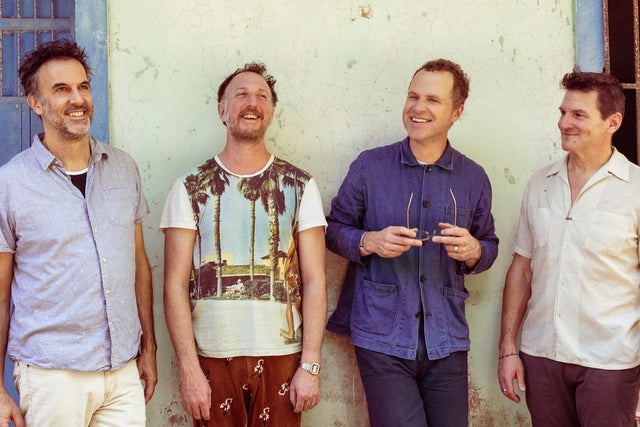Guster in Concert
In their early years, veteran Boston alternative rockers Guster brought a scrappy, back-porch DIY feel to their shows by performing in a stripped-down setting with hand percussion, playing bass lines on a regular guitar. When they toured in support of albums like 1995's ‘Parachute' and 1997's ‘Goldfly,' this approach proved infectious, earning them as much of a following as their early singles like "Airport Song" and "Demons" had attracted. By the time they released the ‘Lost and Gone Forever' album in 1999, though, Guster had expanded their sound both stylistically and in terms of their instrumental arsenal. They retained their tuneful, hook-laden, pop-friendly feel, but their music became richer, and their shows reflected that evolution, with drum kit replacing the percussion, real bass guitar playing the bass lines, and a fuller vibe achieved overall. Current Guster concerts incorporate elements of that early approach, with drummer Brian Rosenworcel switching back and forth between drum kit and percussion. But the humor that's always been a part of the band's aesthetic hasn't receded, and Guster shows always have a feel-good atmosphere.?
Guster Background
Guster was formed in 1991, when the original band members (Ryan Miller, Adam Gardner, and Brian Rosenworcel) were all attending Tufts University. Though their sound was based around concise, melodic, pop-friendly alt-rock tunes, Guster found a following with jam-band fans early on. They self-released their first two albums, 1995's ‘Parachute' and 1997's ‘Goldfly,' but after nabbing a deal with Sire Records in '98, ‘Goldfly' was reissued. ‘Lost and Gone,' released in 1999, was the album that changed things for the band. Overseen by legendary producer Steve Lilywhite (U2, Dave Matthews Band, Peter Gabriel), it expanded on the stripped-down, homemade sound of Guster's earlier recordings, and earned the band a whole new audience in the process. The hits "Barrel of a Gun" and "Fa Fa" emerged from the album. Subsequent releases were increasingly successful, and 2003's ‘Keep It Together' boasted the biggest hit of the band's career: "Amsterdam." It was around this time the band expanded to a foursome with the arrival of multi-instrumentalist Luke Reynolds, who was replaced in 2010 by Joe Pisapia. But for a band that's been refining its sound for as long as they have, Guster has managed to remain remarkably true to its initial impulses, consistently creating hook-heavy tunes full of forward momentum and breezy fun in equal amounts.

